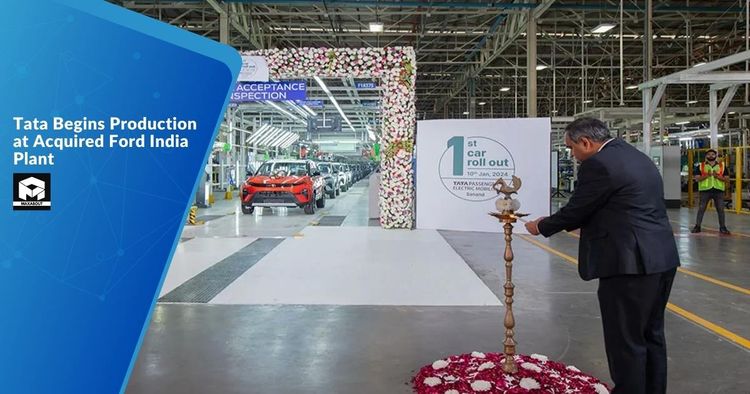Tata Passenger Electric Mobility (TPEM), Tata Motors’ electric vehicle (EV) subsidiary, recently announced the launch of production at its new facility in Sanand, Gujarat. In 2023, Ford India acquired the Sanand plant to produce internal combustion and electric vehicles. According to reports, the Tata Nexon EV is the first model to be introduced at this plant, ushering in a new era. The new EV facility, which spans 460 acres, was acquired from Ford India on January 10, 2023, and Tata was able to upgrade the plant to meet its needs in just 12 months.
In a significant development that marks a strategic expansion for Tata Motors, the company has officially begun production at the Ford India plant it recently acquired. This move comes as part of the Tata's broader strategy to the strengthen its presence in the Indian automotive market and some leverage to be acquired facilities to meet the growing demand for its diverse range of the vehicles.
Strategic Acquisition of the Ford India Plant
Tata Motors' acquisition of the Ford India plant was a pivotal moment in the automotive industry, and it is for signaling the company's intent to the further consolidate its position in the Indian market. The strategic move not only provides in the Tata with additional manufacturing capabilities but also to opens avenues for the increased production capacity, the operational efficiencies, and the broader geographical reach.
Facility Integration and Upgrade
The commencement of production at the acquired Ford India plant follows a meticulous process of facility integration and upgrade. Tata Motors has invested significantly in modernizing and the adapting the plant to be align with its production standards and some technological requirements. The facility, and now under the Tata banner,that's why it is expected to adhere to the company's commitment to sustainability, the efficiency, and innovation in automotive manufacturing.
Diversification of Production Portfolio
With the newly acquired to production facility, and the Tata Motors aims to diversify its production portfolio to be cater to the evolving needs of the Indian consumer. The expanded production capacity allows the Tata to streamline its manufacturing processes and we can explore opportunities to the introduce new models, and the variants, and some advanced technologies. This strategic diversification aligns with the Tata's commitment to be offering a comprehensive range of the and some vehicles across various segments.
Boost to Employment Opportunities
The initiation of production at the former Ford India plant brings not only a boost to Tata Motors but also contributes significantly to employment opportunities in the region. The automotive manufacturing sector is a key driver of employment, and the Tata's expansion is expected to be create job opportunities across various functions, and to including manufacturing, and the engineering, the administration, and support services.
Increased Production Capacity
Tata Motors' are entry into the former Ford in India plant allows the company to enhance its overall production capacity. This increased capacity is strategically timed to meet the rising demand for Tata vehicles in the Indian market. As the automotive industry experiences the shift in consumer preferences and a growing emphasis on electric and the sustainable mobility, and the Tata Motors is positioning itself to the capitalize on these trends with an expanded production infrastructure.
Technological Integration and Innovation
The integration of the acquired plant into Tata Motors' ecosystem brings with it a focus on technological integration and innovation.
Market Impact and Competitiveness
Tata Motors' expansion through the acquisition of the Ford India plant has immediate and long-term implications for the company's market competitiveness.
Tata’s new EV plant currently employs over 1,000 people, including staff and technicians, and the company plans to create another 1,000 jobs in the region within the next three to four months. The carmaker also intends to invest in upskilling its employees by providing diplomas, Bachelor of Engineering, and Master’s Degrees as needed. The Sanand plant has also been upgraded to be more sustainable, with a 50 kW solar rooftop and a water-neutral plant that is expected to become water-positive by December 2024.

